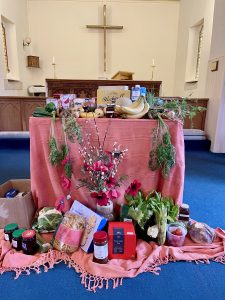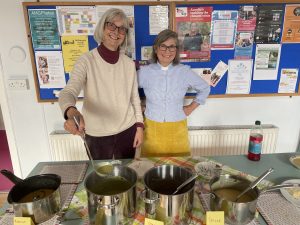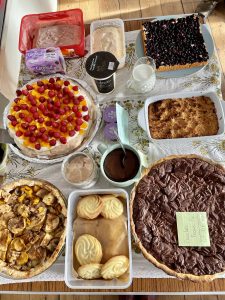Harvest St Andrew’s 2025




Today we celebrated our Harvest Festival. In a beautifully decorated church, accompanied by Alison, we sang the traditional harvest hymns as we offered our thanks and praise. This was followed by a delicious soup and pud lunch in the hall. Thank you to all who supported and provided such great food, especially thanks to Robin and Helen who did so much in preparation for the service and lunch. The alter offerings were taken to the food bank after the service.
Next Saturday 11th October is the church walk followed by tea in the hall. Meet in the hall at 1.30pm – everyone welcome.
The AGM will be held after the service on Sunday 19th October. Please do support, any outstanding reports, please send to Helen.
This Week
Tuesday 10am – Prayer Group in the Garden Room
Thursday 10am – Said Holy Communion followed by coffee in Friendship House.
Saturday 11th October 2pm – Church walk followed by tea in Friendship House
Readings for next Sunday – 17th Sunday after Trinity – 2 Kings 5:1-3,7-15 2 Timothy 2:8-15 Luke 17:11-19
Today’s readings – Deuteronomy 26 1-11, Philippians 4 4-9, John 6. 25-35
Today we celebrate our Harvest Festival. It’s a time when, perhaps more than at any other time of the year, we think about giving.
For Christians giving, in all its forms, whether financial, practical or of the heart, is like sowing seeds. Those who sow sparingly cannot hope for anything but a meagre harvest, but those who sow with a generous hand will in due course reap a generous harvest.
And the true harvest of Christian living is not material. It is not the wealth of possessions, but of the heart and spirit. However, as we thank God for the food on our table, we are also called to share what we have, constantly returning to the teaching of Jesus that what we do for others we do for God. (Matthew 25.31-40)
However, our giving is not a one way street. When we are in a position of being relatively comfortable, when we are no longer in need, then we can grow complacent about acknowledging where those blessings came from in the first place.
That Biblical call to acknowledge God in our lives can be seen in the reading from Deuteronomy. When the Israelites reached the Promised Land, they were told to take the first fruits of the harvest and give them to God in thanksgiving for all the blessings they had received from him. Even though they no longer had to rely on God for their immediate survival, by his sending down Manna from heaven to them in the wilderness, it was important for them to keep that awareness of reliance upon God. Likewise, our material fullness can sometimes mask our spiritual need.
In today’s Gospel Jesus reminds all those around him, and us, that we should not be concentrating all our efforts and thoughts on the purely material gifts:
“I tell you the truth, you were looking for me not because you saw miraculous signs but because you ate the loaves and had your fill. Do not work for food that spoils, but for food that endures to eternal life, which the Son of Man will give you.” John 6:26-27
As they often did the people around him at the time completely missed the point and they asked Jesus what further miraculous signs he would show them and, regarding loaves, they reminded Jesus that Moses had fed his people in the desert with manna from heaven. They still simply want to eat their fill.
But Jesus reminds them that it was not Moses who gave them bread from heaven, but God himself, and then seeks to move their understanding of bread on as he says,
“For the bread of God is he who comes down from heaven and gives life to the world.” John 6:33
“Sir”, they said “from now on give us this bread’” John 6:34
“I am the bread of life. He who comes to me will never go hungry and he who believes in me will never be thirsty.” John 6:35
Jesus is not seeking to ignore real hunger and thirst – after all it is only at the start of this same chapter that Jesus fed the 5000 with real food and drink and, as we know, we need to feed ourselves and others – but he is also seeking to move the people further and deeper into their spiritual needs.
He is speaking to the spiritually hungry and thirsty, those around him and to us, and telling us that when we eat the bread of life our deepest needs are met, and we shall be filled for ever. Not with food that spoils but with eternal food sent from heaven for us and for our salvation. Chapter 6 then concludes with Jesus saying that his body is real food and his blood is real drink and that unless we eat and drink of him we have no life in us. It is a remarkable journey from the physical feeding of the 5000 to the spiritual feeding of hall is followers.
So, at Harvest indeed every week, we give thanks and rejoice for all that God has given us, we share our gifts with those around us, but most importantly we draw close to Jesus through our worship and through the sharing of his body and blood in bread and wine knowing that through him we are filled and raised to everlasting life.
Amen.
